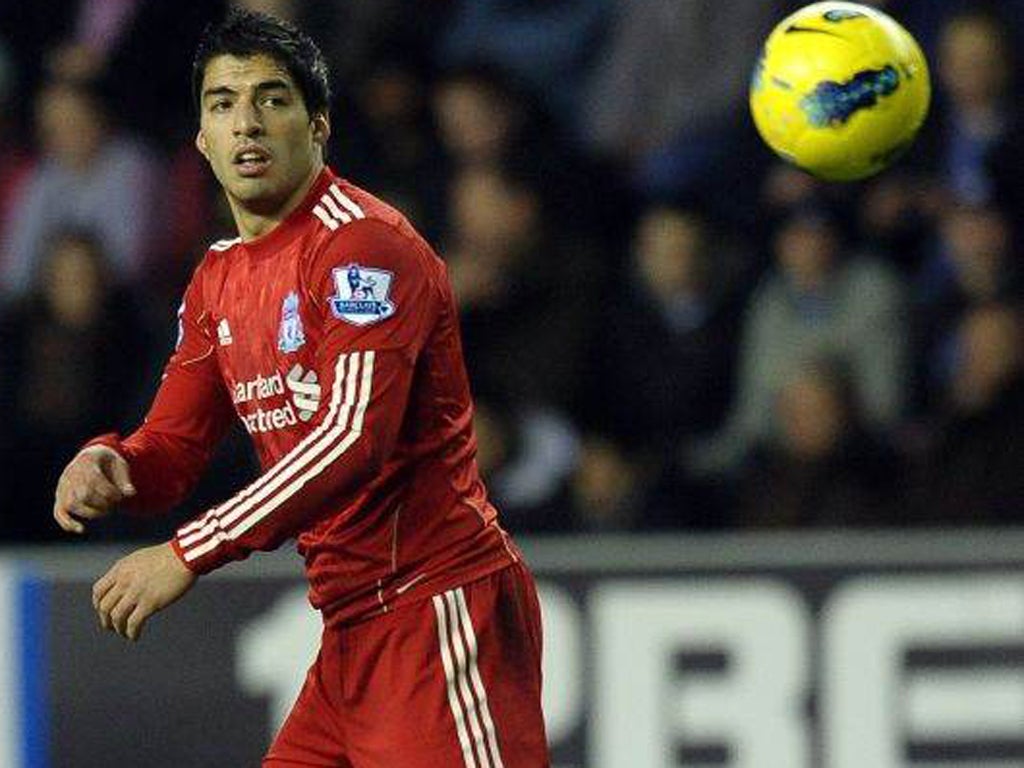Suarez's evidence was implausible and incredible
FA reveal full reasons why Liverpool star has been banned for eight games

Your support helps us to tell the story
From reproductive rights to climate change to Big Tech, The Independent is on the ground when the story is developing. Whether it's investigating the financials of Elon Musk's pro-Trump PAC or producing our latest documentary, 'The A Word', which shines a light on the American women fighting for reproductive rights, we know how important it is to parse out the facts from the messaging.
At such a critical moment in US history, we need reporters on the ground. Your donation allows us to keep sending journalists to speak to both sides of the story.
The Independent is trusted by Americans across the entire political spectrum. And unlike many other quality news outlets, we choose not to lock Americans out of our reporting and analysis with paywalls. We believe quality journalism should be available to everyone, paid for by those who can afford it.
Your support makes all the difference.Luis Suarez gave "unreliable" and "inconsistent" evidence to the independent commission investigating claims that he racially abused Patrice Evra during Liverpool's match against Manchester United on 15 October, it emerged last night.
In the full written reasons for the commission's ruling, released yesterday by the Football Association, it was revealed the Liverpool striker called Evra "negro" seven times during the match at Anfield. It said his version of events was "implausible" and "simply incredible", and added that two similar offences in future could lead to a "permanent suspension". Liverpool have been given the right to appeal by 13 January.
Evra said that he initially took the Spanish word to mean "nigger" but subsequently accepted that what was meant by it was probably "blackie".
Suarez claimed when he was growing up in Uruguay the word was often used as a friendly form of address to anyone with black or brown skin or even with black hair. He added that it was not intended to be offensive. The commission took into account expert evidence from Uruguay that the word is often used in a friendly way but can be used in an offensive manner, depending on the context.
Those experts said that if it is used in the context of what Evra alleged had been said to him, that would be seen in Uruguay as racially offensive.
The commission further concluded that while Evra's evidence was "credible", given in a "calm, composed and clear way", Suarez's was unreliable "in relation to matters of critical importance". The summary said Suarez's version was, in part, inconsistent with the evidence, especially video footage, and that he claimed his use of "the word negro to address Mr Evra was conciliatory and friendly. We rejected that evidence. To describe his own behaviour in that way was unsustainable and simply incredible given that the players were engaged in an acrimonious argument. That this was put forward by Mr Suarez was surprising and seriously undermined the reliability of his evidence on other matters.
It added, "There were also inconsistencies between his accounts given at different times as to what happened", and Suarez should have known that using the word negro to Evra was not acceptable, particularly in the light of FA campaigns against racism.
As a result, they fined Suarez £40,000 and banned him for eight games, suspending the punishment to allow Suarez a chance to appeal.
The commission commented that Suarez was likely to suffer acute embarrassment from the ruling because he supports a charitable project in South Africa that is designed to promote multi-racial football, and noted that Suarez said he would not use the word again on a pitch in England.
The incident was triggered in the 58th minute of the match when Suarez fouled Evra. Five minutes later the Manchester United defender was marking Suarez at a corner, the first time they had come together since the foul. The two players were then involved in a row, and they were spoken to by the referee, Andre Marriner.
Evra made a complaint to the referee at the time and after the game, which triggered an FA investigation. On 16 November, Suarez was charged with using abusive and/or insulting words and/or behaviour towards Evra, including a reference Evra's ethnic origin and/or colour and/or race.
Between 14 and 20 December the commission heard evidence about the incident from match officials and staff from the two clubs including United's Ryan Giggs and Sir Alex Ferguson and Liverpool's manager, Kenny Dalglish.
The FA's case, according to the report, was that Evra asked Suarez why he kicked him, to which the forward replied: "Because you are black." When Evra challenged him to repeat the answer, Suarez said: "I don't speak to blacks." Evra then told Suarez he was going to hit him, to which Suarez said in Spanish: "Okay, blackie, blackie, blackie".
The report added that Suarez had "damaged the image of English football around the world".
War of words
Evra's version of events
Evra Why did you kick me?
Suarez Because you are black.
Evra Say that to me again. I'm going to punch you.
Suarez I don't speak to blacks.
Evra I'm going to punch you.
Suarez OK, blackie, blackie, blackie. Suarez then touched Evra's arm, gesturing at his skin.
Evra Ref, ref, he just called me a fucking black.
Suarez's version of events
Evra Why did you kick me?
Suarez (shrugging): It was a normal foul.
Evra I'm going to kick you.
Suarez Shut up. (Suarez then touched Evra's arm in a pinching-style movement).
Evra Don't touch me, South American.
Suarez Por que, negro (Why, black?)
Join our commenting forum
Join thought-provoking conversations, follow other Independent readers and see their replies
Comments